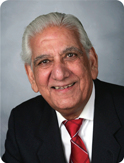
Continued Service
Wednesday, September 1, 2010
By Kevin Moe
For many, retirement means the end of the workaday world. For many emeritus professors, their work continues unabated. When you retire from most organizations, they take away your key, your access privileges, and do not expect any more from you. At a university, you are offered the opportunity to be emeritus—to keep your keys, your access privileges, and receive opportunities to participate in scholarly work. The difference in being emeritus is that you don’t get paid. Here is a look at two Carlson School emeritus faculty who continue to put in a day’s work for the betterment of their field.
Mahmood Zaidi
As his title indicates, Distinguished International Emeritus Professor Mahmood Zaidi has led a distinguished career. A long-time professor, he is the founding director of International Programs, which has grown by leaps and bounds since its creation in the mid-1980s.
Since his retirement in 2008, Zaidi has not slowed down one bit. “I wanted to stay alive professionally in the area in which I have been trained,” he says. “It is ingrained in you.”
Three areas of professorship—research, teaching, and attending seminars—make up the backbone of Zaidi’s work. In 2009 and 2010, he taught international human resource management in China and helped a PhD and an MA student in the pipeline to graduate from the HRIR program. He also has participated in several international meetings, including the International Academy of Management and Business Conference in Istanbul, Turkey, and the Athenian Policy Forum 10th Biennial Conference on Regulatory Responses to the Financial Crisis held at the Bundesbank in Frankfurt, Germany.
As for research, he has co-authored an article with Thomas Norman called “Offshoring of IT and Professional and Technical Services: The Recent Experience of the United States” in the book Global Outsourcing and Offshoring: An Integrated Approach to Theory and Corporate Strategy. His own book, Beyond MBA: Management Education in Transition Economies, written with Aleksander Sulejewicz, was recently published. He is currently working on a book about globalization and labor market outcomes.
“Job satisfaction for professors is very high,” he says. “I want to work here as long as I can. These are the people I know—the people I’ve most admired are here at the University.”
Gordon Davis
The Honeywell Chair in Management Information Systems, Emeritus Professor Gordon Davis, was the second faculty member in the school to be given an endowed chair. In the late 1960s, he was one of the important architects of the fledging field of Management Information Systems. He participated in every major project to define the curriculum and wrote 23 books on computing and information systems. His text, Management Information Systems: Conceptual Foundations, Structure, and Development, is considered a classic. He had visiting appointments and gave presentations at universities in 25 countries and was awarded three honorary doctorates. He became emeritus in 2004 after 43 years at the University.
As an emeritus professor, Davis continues to author and review articles, give advice to students and faculty, and give presentations at the major conferences in the field. He also continues his international activities. In 2007, he visited China as a distinguished academic visitor. This November, he will be giving advice remotely to a doctoral student conference in Australia, and in December will sit on a panel discussing technological innovations at the International Conference on Information Systems.
“In the work that I do as an emeritus professor and in my talks and panel presentations I conceptualize and synthesize from my experience and my observations of the field,” he says. “I believe that my comparative advantage at this point in my career is my ability to place problems and proposed solutions in perspective and to generate interesting ideas. I am active because I am still fascinated and motivated by the intellectual issues and pedagogical problems of the information systems field.”

